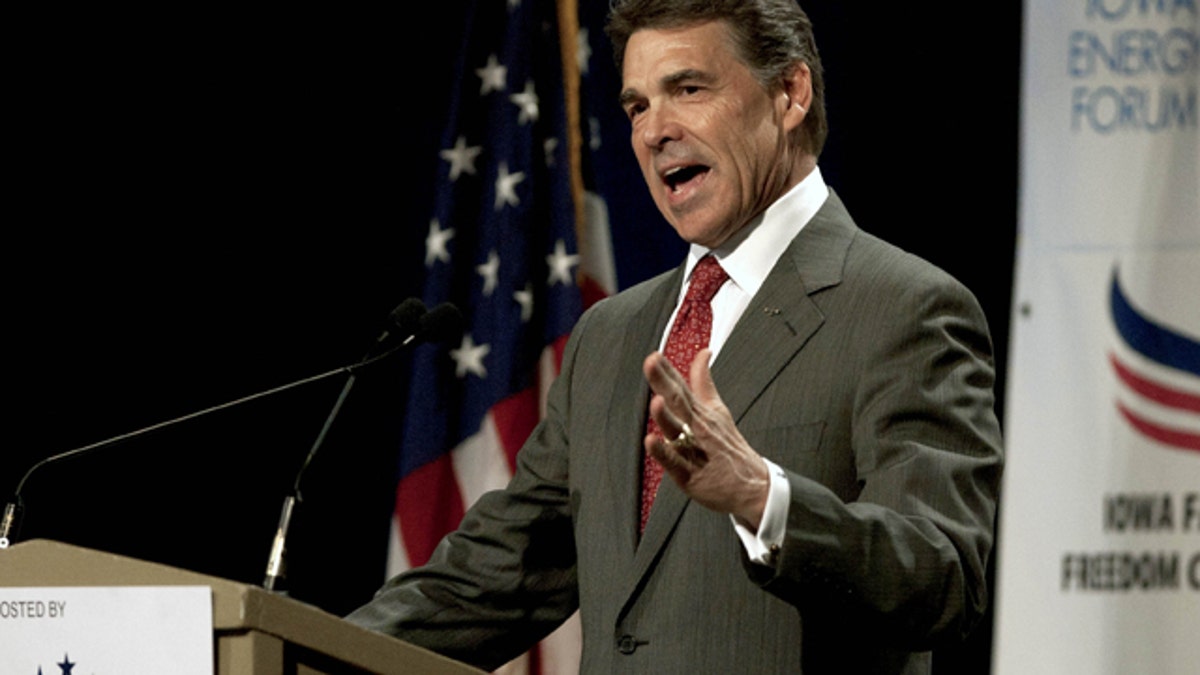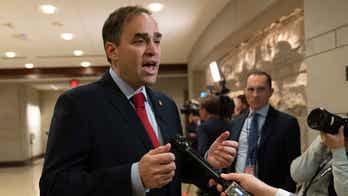
Oct. 22, 2011: Texas Gov. Rick Perry speaks at the Iowa Faith and Freedom Coalition presidential candidate forum, in Des Moines, Iowa. (AP)
Rick Perry is proposing letting Americans choose between their existing income tax rate or a new flat tax of 20 percent, part of a tax and spending reform plan that the Republican presidential candidate is dubbing "Cut, Balance and Grow."
"The goal of my 'Cut, Balance and Grow' plan is to unleash job creation, address the current economic crisis, while at the same time generating a stable source of revenue to address our record deficit and put our fiscal house in order," Perry, the governor of Texas, said at an event Tuesday in South Carolina.
Perry said people taking up the flat tax can scrap the current code, and it would lower and simplify tax rates to the point that Americans could file their tax returns on a post card, which he pulled out as he spoke.
His plan would also get rid of the Alternative Minimum Tax for families, balance the federal budget by 2020, reform entitlements, ban earmarks and impose a cap on federal spending at 18 percent of gross domestic product.
Perry's proposed flat tax would preserve key tax exemptions for families earning less than $500,000 a year and would increase the standard deduction to $12,500 for individuals. It would also eliminate the tax paid on the country's largest estates when property owners die and eliminate taxes on Social Security benefits.
He also revived a proposal to allowed young workers to invest part of their payroll taxes into private accounts -- a plan that President Bush once pushed until it died in a Republican-controlled Congress.
"The flat tax will unleash growth but growth's not enough," Perry said. "We must put a stop to this entitlement culture that risks the financial solvency of this country for future generations. I mean the red flags are alarming."
He called for corporate tax reform, including a one-time reduced tax rate of 5.25 percent for businesses that bring their profits that are parked overseas back to the U.S.
"The U.S. Chamber (of Commerce) estimates this one-time tax reduction would bring more than $1 trillion in capital back to the U.S. create up to 2.9 million jobs, and increase economic output by $360 billion," he said.
"In other words, it's the kind of economic stimulus President Obama could have achieved if he wasn't hell-bent on passing big government schemes that have failed American workers," he said.
Perry's proposal comes two and a half months after he began running for the GOP nomination, and following lackluster appearances in several debates.
The policy rollout is a critical part of Perry's efforts to right a struggling campaign as well as set him back up against rivals like Mitt Romney, who hasn't suggested a flat tax, and Herman Cain, who has proposed a 9-9-9 plan of 9 percent corporate income tax rates and a 9 percent national sales tax.
Publisher Steve Forbes, one of Perry's key supporters for the 2012 Republican nomination, described the proposal as appealing to all comers.
"You have to make a real sum of money before the tax kicks in," Forbes told Fox News, describing the basics of Perry's plan. "Middle-income people are not going to pay more and they are going to save huge amounts of money."
Unlike Herman Cain's 9-9-9 plan, which relies largely on a new national sales tax, Perry said he would avoid a sales tax while lowering the corporate tax to 20 percent and eliminate taxes on dividends and capital gains, aiming to free up money that presumably would be invested in economic growth.
Forbes argued that a flat tax gets rid of the billions of hours in paperwork, and possibly the millions of jobs that go with tax filings. Without changes to the code, he noted, the Tax Foundation estimates that by 2015, $483 billion alone will be spent on trying to interpret and understand the code.
"You put something like the Perry plan in place, that is several hundred billions in savings off the bat, that's huge," he said.
Proponents of the flat tax argue that a uniform rate will improve the U.S. economy because it will increase take-home wages, in essence incentivizing work. Lower taxes, they claim, will also encourage entrepreneurship.
President Obama's campaign, ready on the criticism, issued a statement saying Perry's plan, as well as Romney's are intended to benefit high-income households at the expense of the middle class.
"Both the Romney and Perry economic plans embrace a far-right vision for our tax code," wrote James Kvaal, policy director for Obama for America. "They share elements with plans offered by congressional Republicans, which independent economists believe would fail to accelerate job creation now. Both plans would cut taxes on wealth and investment income, shifting the tax burden onto work and wages. Both plans are likely to be costly, driving up the deficit at a time of historic fiscal challenges. And under both plans, the most fortunate Americans would pay less while the middle class would pay a higher share."
But Perry's campaign dismissed the criticism.
"Gov. Perry's plan will reduce taxes for everybody and grow the economy and not pit Americans against each other like President Obama is doing," Perry campaign spokesman Mark Miner told Fox News.
The Club for Growth, a conservative economic group, praised the proposal.
"Rick Perry's plan for tax reform would be massively pro-growth," the club's president, Chris Chocola, said. "A flat tax like the one proposed by Perry would unleash years of economic growth if it is passed into law.
Chocola said he continues to be "disappointed" that Romney has not embraced a flat or fair tax.
"He would be wise to avoid using class warfare when comparing his current proposals to those of Gov. Perry or Herman Cain," he said. "The Club for Growth is looking for bold leadership on tax reform from the Republican nominee -- not demagoguery or platitudes."




